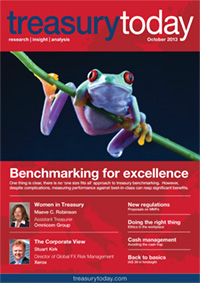Contents
- Editorial
- Will MMFs make it over the regulatory hurdle?
- Women in Treasury
- Women in Treasury: Maeve C. Robinson, Omnicom Group
- Question Answered
- Overcoming COBO challenges
- Market View
- Is Citi right or wrong about Asia’s economic growth potential?
- Insight & Analysis
- The art of benchmarking
- Talking Treasury Forum
- Global Cash Management
- Regulation
- MMFs regulations: is it too late to influence the outcome?
- The Bigger Picture
- Karl Marx
- Advertorial: CRH Group
- With a little help from my friends
- The Corporate View
- Corporate View: Stuart Kirk, Xerox
- Product Profile: RBS
- Key trends in cash and trade
- Cash Management
- Escaping the cash trap
- Smarter Treasury: HSBC Global Asset Management
- Coping with low rates and changes in the money markets
- Sustainability
- The only way is ethics
- Back to Basics
- IAS 39
Editorial
Will MMFs make it over the regulatory hurdle?
The battle over new money market fund (MMF) regulations is coming to a head on both sides of the Atlantic. Early last month the European Commission (EC) put forward its proposals as to how to ensure the stability of the MMF industry and the money markets as a whole whilst, in the US, the three-month consultation regarding the US Securities and Exchange Commission’s (SEC) proposals saw a flurry of comments before it closed for consultation on 17th September.
The main point of contention in both sets of proposals is the major restrictions proposed for constant net asset value (CNAV) funds and the encouragement regulators are giving to managers converting to variable net asset value (VNAV) MMFs. Most market participants believe it will be to the detriment of investors, issuers and the economy as a whole. The SEC directly proposes MMFs to move to VNAV or continue as CNAV with the use of liquidity gates and fees. The EC proposal, on the other hand, calls for CNAV funds to have a ‘capital buffer’ of 3% which, argues its opponents, is uneconomic for an asset manager to hold in a MMF.
However, even the use of liquidity gates and fees if a fund’s liquidity level falls below a specified threshold is not finding favour in the US. In his comment published on the SEC website, Gregg Murphey, Manager Global Treasury, Novelis Inc., argues that this proposal will “bring into question one of the greatest strengths of a prime MMF – liquidity”.
In addition, given the SEC’s decision to reject the use of capital buffers for US MMFs, the Institutional Money Market Fund Association (IMMFA) believes that there is now a “serious risk that cross-border arbitrage opportunities will be created”. However our analysis is that the opportunity for arbitrage is limited by tax and other regulatory issues.
Secretary General of IMMFA, Susan Hindle Barone, has issued a call to action for all market participants to “make their voices heard, whichever avenue that takes”. But it may be too late.
To help corporate treasurers navigate the complexities of new MMF regulations, Treasury Today is publishing a special article on the subject in this issue.


